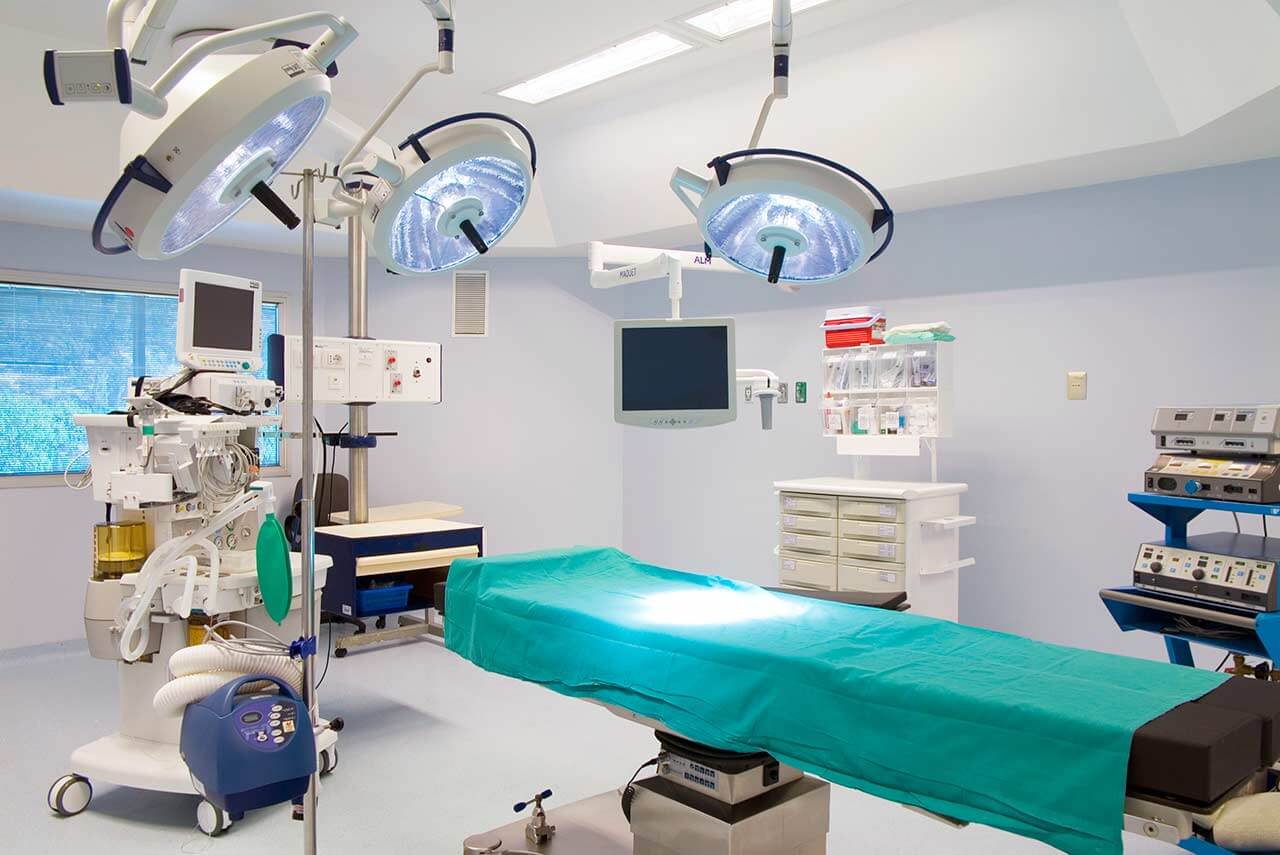
About the Department of General and Abdominal Surgery, Hernia Surgery, Bariatric Surgery and Colorectal Surgery at MIC Hospital Berlin
The Department of General and Abdominal Surgery, Hernia Surgery, Bariatric Surgery and Colorectal Surgery at the MIC Hospital Berlin provides the full range of services in the areas of its specialization. The key focus of the department's clinical practice is performing surgical procedures for gastroesophageal reflux disease (GERD). The department performs a large number of interventions to implant the LINX Reflux Management System in patients with GERD. It is this modern operation that is the most effective and least traumatic method of treating the pathology. The department also successfully performs operations to treat diseases of the gallbladder, thyroid gland, rectum, anus, and abdominal adhesions. The surgical options of the medical facility are complemented by hernia repair and morbid obesity treatment. All interventions are performed using minimally invasive techniques in specially equipped, high-tech operating rooms. The department was one of the first highly specialized medical facilities to start practicing minimally invasive surgery, and today it boasts 25 years of experience in this field. The department's specialists perform more than 7,000 operations every year, achieving excellent treatment outcomes. At the same time, patients are guaranteed the highest safety of surgical treatment.
The department is headed by Dr. med. Gerold Koplin. The surgeon is board certified in general and abdominal surgery. The doctor's special clinical focus is the treatment of gastroesophageal reflux disease, including LINX Reflux Management System implantation. This innovative treatment is only available in Germany's most advanced medical facilities. Dr. med. Koplin is known as one of the best experts in the field of GERD surgery in Germany and is also successful in other general and abdominal surgical procedures.
Gastroesophageal reflux disease is caused by sphincter dysfunction, due to which the contents of the stomach are thrown into the esophagus. The disease causes mucosal damage and unpleasant symptoms, including heartburn, belching, burning behind the sternum, and a persistent cough. In many cases, patients manage to control GERD with non-drug methods (nutrition adjustments, refusal of bad habits, and other measures) and drug therapy (antacids and proton pump inhibitors). However, drug therapy is often temporary and may also cause severe side effects.
You can get rid of your gastroesophageal reflux disease once and for all with the help of a surgical intervention, which is indicated for patients with a severe course of the pathology and in the absence of an improvement in the patient's condition after drug therapy. Surgery eliminates the very cause of GERD, that is, sphincter dysfunction. The department offers the following two methods of surgical treatment of gastroesophageal reflux disease: minimally invasive fundoplication and LINX Reflux Management System implantation. With appropriate clinical indications, the specialists prefer the last option of the operation. The LINX Reflux Management System is a small ring made of metal balls with a magnetic core. The anti-reflux device allows the doctors to normalize the esophageal sphincter due to the attractive force between the metal balls, which ensures the closure of the sphincter and prevents reflux. The operation is performed using minimally invasive techniques under general anesthesia. The very next day after the operation, a patient will be discharged and can return to their usual way of life. The LINX Reflux Management System implantation has high success rates and practically does not pose any risks to the patient's health.
The department's team of surgeons regularly admits patients with various types of hernias, including inguinal, umbilical, femoral, incisional, diaphragmatic, and anterior abdominal wall hernias. Any hernia is a pathological protrusion of certain organs from the cavity occupied by them in the normal state through a hole in the tissues. There is only one effective treatment method to eliminate a hernia, and this is surgery. All types of hernioplasty available in the department are performed using minimally invasive techniques through one or two small incisions. The essence of any hernioplasty is to eliminate a hernia defect and strengthen this area with the patient's own tissues or special synthetic meshes.
An important focus of the department's work is bariatric surgery. Bariatric interventions are usually indicated for morbidly obese patients (with a body mass index of 40 or more) who cannot lose weight with standard methods such as diet, exercise, and drug therapy. The department's surgeons specialize in performing gastric bypass, gastric banding, sleeve gastroplasty, and biliopancreatic bypass. During a gastric bypass, the organ is divided into two parts (small and large). Food enters a small part of the stomach, and from there it goes immediately into the intestines. Due to this, a person consumes less food and, at the same time, feels full quickly. The essence of gastric bandaging is the imposition of a special bandage, which also divides the stomach into two parts. When performing a sleeve gastroplasty, the department's surgeons remove part of the stomach, as a result of which patients can no longer eat large portions and lose weight. Biliopancreatic shunting involves not only a reduction in the volume of the stomach but also small intestine reconstruction. This operation is the most complex of all those available. The department's surgeons perform all of the above-mentioned interventions using minimally invasive techniques, so patients recover quickly and do not experience any severe pain in the postoperative period.
In the field of colorectal surgery, the department's doctors treat rectal and anal diseases. The specialists most often deal with benign and malignant neoplasms of the colon and rectum, inflammatory processes in the colon and rectum, rectal prolapse and pelvic organ prolapse, rectocele, hemorrhoids, anal fistulas, constipation, and fecal incontinence. Colorectal surgeons conduct diagnostics, and if the results require the patient to have surgery, they begin planning the upcoming surgical treatment. The department's specialists have exceptional skills in laparoscopic interventions. After such operations, patients can move independently within a few hours after the intervention and practically do not experience any pain, which is impossible after classical open surgery. In addition, the risks of minimally invasive interventions are negligible. Due to its small incisions, laparoscopic surgery also provides a good aesthetic result.
The department's main clinical focuses include:
- General and abdominal surgery
- Laparoscopic surgery for gastroesophageal reflux disease
- Fundoplication
- LINX Reflux Management System implantation
- Laparoscopic surgery for gallbladder diseases
- Endoscopic surgery for thyroid diseases
- Laparoscopic surgery for abdominal adhesions
- Laparoscopic surgery for gastroesophageal reflux disease
- Hernia surgery
- Laparoscopic surgery for inguinal hernias
- Laparoscopic surgery for umbilical hernias
- Endoscopic surgery for femoral hernias
- Laparoscopic surgery for incisional hernias
- Laparoscopic surgery for diaphragmatic hernias
- Laparoscopic surgery for anterior abdominal wall hernias
- Bariatric surgery
- Laparoscopic gastric bypass surgery
- Laparoscopic gastric banding
- Laparoscopic sleeve gastroplasty
- Laparoscopic biliopancreatic shunting
- Colorectal surgery
- Endoscopic surgery for benign and malignant colon and rectal tumors
- Endoscopic surgery for inflammatory processes in the colon and rectum
- Endoscopic surgery for rectal prolapse
- Endoscopic surgery for pelvic organ prolapse
- Endoscopic surgery for rectocele
- Endoscopic surgery for hemorrhoids
- Endoscopic surgery for anal fistulas
- Endoscopic surgery for constipation
- Endoscopic surgery for fecal incontinence
- Other surgical options
Curriculum vitae
Higher Education and Professional Training
- 1998 - 2005 Human Medicine studies at the Medical University of Berlin (Charite).
- 2006 - 2013 Board certification in General Surgery, Charite University Hospital Berlin.
- 2013 - 2016 Board certification in Abdominal Surgery, Charite University Hospital Berlin.
Medical Practice
- July 2006 - February 2016 Surgeon, Department of General, Abdominal, Vascular and Thoracic Surgery, Charite University Hospital Berlin.
- Since March 2016 Surgeon, Department of General and Abdominal Surgery, Hernia Surgery, Bariatric Surgery and Colorectal Surgery at the MIC Hospital Berlin.
Memberships in Professional Societies
- German Society of Surgery (DGCH).
- German Society for General and Visceral Surgery (DGAV).
- International Federation for the Surgery of Obesity and Metabolic Disorders (IFSO).
- Surgical Working Group on Obesity Treatment and Metabolic Surgery (CAADIP).
- Surgical Working Group of Endocrine Surgery (CAEK).
Photo of the doctor: (c) Klinik für MIC




